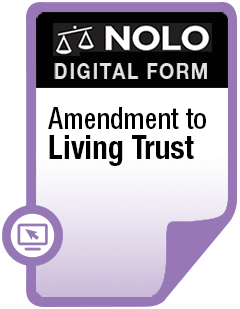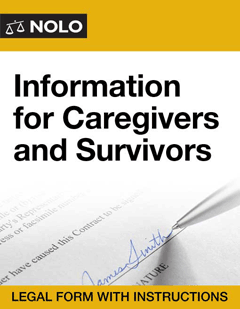If you plan ahead, here's a collection of forms you can use while you're still alive, if you plan ahead, to avoid having your assets go through probate when you die.
- Transfer-on-Death (Beneficiary) Deeds
- Living Trusts
If you are already in probate, you may find the forms for transferring property useful.
- Quitclaim Deed
- Assignment of Rights
Transfer-on-Death (Beneficiary) Deeds (not available in all states)
Transfer-on-death deeds bypass probate the same way your Transfer-On-Death (TOD) financial accounts do. You name a beneficiary and they get the property directly, without the property ever passing through probate.
This is a simpler alternative to a living trust if avoiding probate is your goal.
Only some states allow this type of deed for real estate. It is a rather new invention, as a way of offering a simpler alternative to living trusts as a means of probate avoidance.
Florida Transfer-on-Death (Beneficiary) Deed
We do not offer a Transfer on Death Deed for Florida at this time. They are only available in Illinois, Nevada, Kansas, Colorado, Missouri, Oregon, Ohio, Oklahoma, Indiana, Arkansas, Alaska, Arizona, New Mexico, Washington, and Wisconsin.
Living Trusts
Online Living Trust (Nolo)
Click here to create your living trust online. In the event of your death, make sure that your property goes directly to the people you’ve designated.
Use this form to create your online living trust. Make sure that your property bypasses lengthy and expensive probate proceedings and goes directly to the people you've designated.
With Nolo's Online Living Trust, you can:
- name beneficiaries to inherit your property,
- avoid probate,
- and much more.
The form is easy to use, thorough, and you can save your progress at any time. You'll also get unlimited revisions of your trust document for one full year.
Amendment to Living Trust
Official - Amendment to Living Trust
Use this form to make simple changes to your living trust — for example, to add or remove beneficiaries or name a different successor trustee. An amendment is an add-on to your existing trust. Everything else about your trust remains the same – including the trust's name --so there is no need to retitle your trust property. You may want to make an amendment to account for life's changes - for example, if: you get married or divorced you have a new child or grandchild, or someone named in the trust dies.
Use this document only for simple changes. This amendment works best when you need to make just a few small changes to your trust.
If you need to make more than a few simple changes, or if any changes you want to make are hard to describe using this form, then do not use this form -- get help from an attorney.
If you made a trust with Nolo's WillMaker, then you can make more substantial changes using WillMaker's “trust restatement. ”
Revoking and making a new trust instead.
If you need to make extensive or complicated changes to your trust, another option is to revoke your existing trust and make a new one. You can revoke your trust with Nolo's Revocation of Living Trust If you do this, you will need to retitle all of your trust property to reflect the name of your new trust. Adding or removing property.
If you only want to add or remove property from your trust, you do not need to revoke or amend your current trust.
Adding or removing property requires updating your property schedules and transferring the property in or out of the trust. Using this amendment form. If you decide to make a trust amendment to modify your trust, fill out this form, print it, and bring it to a notary public.
After you and the notary sign the form, the your changes will be valid.
Instructions for finalizing your amendment print with the document.
You can save and edit your trust amendment before you buy it — just create a Nolo.com account. It ’s easy, free, and there is no obligation. If you do purchase the form, you can edit, print, and download it as often as you like during your 1-year subscription.
Quitclaim Deed For Florida
Florida Quitclaim Deed
Need to transfer property in Florida?
Click here to quickly and easily transfer property using a quitclaim deed.
Legally transfer property in Florida with this simple form
- transfer property to or from a revocable living trust
- transfer property to one spouse as part of a divorce
- clarify an ambiguity about inherited property-- for example, by giving up potential rights to inherited real estate
- settle uncertainties about other kinds of claims -- for example, by relinquishing the rights to an easement
- transfer one co-owner's interest to another co-owner-- for example, when one co-owner buys out another
- transfer part of your interest to a new co-owner -- for example, by transferring property you own by yourself into shared ownership with someone else
- change the way owners hold title to the property -- for example, by transferring title from joint tenants to tenants in common, or the other way around.
Nolo's Florida Quitclaim Deed includes up-to-date instructions for preparing a quitclaim deed, getting it notarized, and recording (filing) it with the county recorder. You'll learn how to:
- complete your quitclaim deed
- prepare a transfer tax form
- file a real property transfer report, and
- record your deed.
Information for Caregivers and Survivors
Official - Information for Caregivers and Survivors
Give caregivers and survivors the information they need to manage your affairs It can be easy to get caught up in the details of planning your estate, but it's important to lay out in one straightforward, clear document, the essential information that caregivers and survivors will need to know in the event of your incapacity or death.
Nolo's Information for Caregivers and Survivors eForm will assist your loved ones in managing your affairs.
You'll systematically break down important details of your life, including:
- the location of essential documents, including
- birth and marriage certificates;
- your home's title; and
- your will,
- living trust, and
- health care directive details relating to your health care, including
- doctor's names and
- the location of your health care directive contact information for your executor,
- professional advisers, and
- the guardian(s) for your minor children
- details and documentation for
- your taxes,
- investments, and
- insurance policies and
- much more.
Give your loved ones the tools and information they need during a difficult time with Nolo's Information for Caregivers and Survivors.
